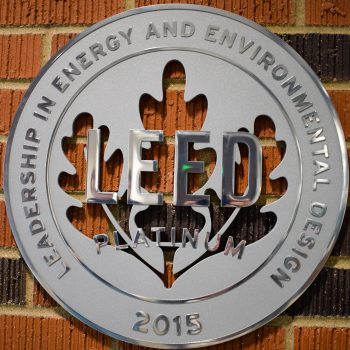Energy Institute Facilities
Powerhouse Energy Campus
The state-of-the-art, 100,000-square-foot Powerhouse Energy Campus (PEC) north of Old Town Fort Collins serves as the Energy Institute’s headquarters, primary research facility, and cleantech entrepreneurship hub. PEC is the largest freestanding university-based energy research and entrepreneurship facility in the United States. In addition to incubator space for CSU-aligned start-ups, PEC houses:
- The Engines and Energy Conversion Laboratory (EECL);
- Indoor/outdoor air quality sensing and testing labs;
- Smart-grid and small village micro-grid labs;
- Large-scale thermal energy laboratories;
- Hydrogen fueling and electric vehicle laboratories;
- A techno-economic and lifecycle analysis team, and
- A rapid prototyping laboratory (RPL).
Colorado State University Main Campus
Dr. Jan Leach’s research focus is plant health. Specifically, she studies how plants defend themselves from pathogenic microorganisms, how climate change impacts plant disease and productivity, and how microbiomes of insects influence the insects’ aggressiveness to plants.
The Bradley Research Group focuses on using advanced system design tools with experimental validation to advance the state of the art in practical, demonstrable systems. This group has constructed an active research program at the nexus of the fields of industrial engineering, energy systems and life cycle assessment (LCA).
Dr. Svetlana Olbina’s research in energy area relates to the integration of building systems to achieve energy-efficient/high performance buildings. She explores how utilization of day lighting in buildings as well as building envelopes (particularly shading devices) can provide energy savings.
The CSU Photovoltaics Laboratory, lead by Professor Jim Sites, focuses on polycrystalline thin-film solar cells, primarily CdTe-based cells fabricated at CSU. Areas of particular interest are the relationship of electronic band structure to photovoltaic efficiency, the effect of defects at interfaces and grain boundaries, and the optics of multilayer solar cells.
Researchers in the Department of Chemical and Biological Engineering have been engaged in producing fuels and chemicals from biomass since the Department’s inception more than 40 years ago. The primary focus has been on biological conversions of lignocellulosic and algal biomass, and on metabolic engineering of microorganisms to produce new molecules from renewable sugars.
The Institute for the Built Environment (IBE) is a trans-disciplinary center based at CSU that is on a mission is to advance the development of healthy, thriving built environments. IBE focuses their research and services on the human dimensions of energy and sustainability through the social sciences, group facilitation and strategic planning, and through the integrative design process.
The Miyake Group, lead by Dr. Garret Miyake, uses light to drive chemical transformations under mild conditions for the synthesis of polymers and small molecules. They are focused on developing polymeric photonic crystal that can selectively reflect light, including IR radiation, to prevent thermalization in warm urban environments.
The Neilson Lab research revolves around understanding and controlling the formation of materials, their structure and their properties, i.e., materials design and synthesis. Our focus is on materials with relevance in energy applications, such as harvest, conversion, and storage.
The Von Fischer Lab studies processes on the land surface that give the atmosphere its greenhouse gas composition. An important area of this research investigates the emission of methane from the natural gas supply chain. Members of this lab develop and apply new technologies and data analytics that reveal how much methane is leaking, and we suggest efficient ways to reduce overall system emissions.
Foothills Campus
Started in 1991, CSU’s Next Generation Photovoltaics lab has been at the forefront of solar power research.Faculty from mechanical, materials, chemical and electrical engineering along with faculty from physics and chemistry are actively involved in NGPV.
The Methane Emissions Technology Evaluation Center (METEC) is developing innovative technologies to cost-effectively and accurately locate and measure methane emissions associated with natural gas production. If successful, these innovations could impact the environment, economy and security.
Powerhouse Overview
Completed in 2014, the Colorado State University Powerhouse Energy Campus is located near the heart of downtown Fort Collins and serves as the headquarters of the Energy Institute.
430 North College Avenue
Fort Collins, Colorado 80524
View directions on Google Maps
Labs within the Powerhouse include areas focused on studying the integration of intermittent renewable resources onto electric grids, evaluating microgrid components, testing photovoltaic devices for solar power, testing large-scale engines, researching indoor air quality, and testing hydrogen and electric vehicles.

LEED-Platinum Facility
In 2015 the Powerhouse was designated as a Platinum level in LEED (Leadership in Energy & Environmental Design) Certification – the highest possible rating offered by the U.S. Green Building Council.
The facility is a state-of-the-art 100,000 square-foot green building and serves as a model for sustainable construction practices and innovative architectural design.
Learn more about LEED certification and see our scorecard.
Tours of the Powerhouse Energy Campus are free and available for individuals and groups. Schedule your tour here. Get directions and parking information here.
